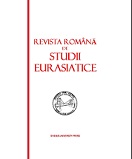THE POSITION OF THE COMMUNIST PARTY OF CHINA TOWARDS THE UNION OF SOVIET SOCIALIST REPUBLICS AND THE EUROPEAN SOCIALIST COUNTRIES AFTER THE 20TH CONGRESS OF THE SOVIET UNION COMMUNIST PARTY
THE POSITION OF THE COMMUNIST PARTY OF CHINA TOWARDS THE UNION OF SOVIET SOCIALIST REPUBLICS AND THE EUROPEAN SOCIALIST COUNTRIES AFTER THE 20TH CONGRESS OF THE SOVIET UNION COMMUNIST PARTY
Author(s): Emy-Maria MogoșSubject(s): Diplomatic history, History of Communism
Published by: Ovidius University Press
Keywords: Eastern Europe; communist countries; Soviet Union Communist Party; People's Republic of China; ideology
Summary/Abstract: The starting point of the Sino-Soviet conflict was represented by the 20th Congress of the Soviet Union Communist Party in the period 14-25 February 1956. The impact of the denouncement of the personality cult and the Stalin’s public conviction was viewed differently from one country to another, depending on the national characteristics and the political-economic situation. Despite the reluctance towards the decisions that were adopted on the 20th Congress of the SUCP, the Chinese leaders wanted to maintain a close relationship with the Soviet Union, but, at the same time, decided to follow their own way in the edification of the socialism according to the national specific characteristics, represented by the defiance of the Soviet leadership and challenging it to a competition, both political and ideological. Since the 50s, the People's Republic of China, together with the leaders of the European Socialist countries, started to get involved in normal party relationships, regular mutual visits between the governments and institutions, cooperated within the organizations and international conferences, made commercial exchanges that were very significant in the Chinese export trade, there was a significant economic cooperation through industrial partnerships, scientific, technological and cultural cooperation projects, students and sports people exchanges, etc. The Chinese authorities seemed satisfied with these relationships, until the mid-60s, when the Sino-Soviet rupture took place. The difference mainly appeared in the public arguments of the Communist Party of China and the Soviet Union Communist Party about the Marxist-Leninist ideology, affecting the party and state relationships. In this context, the relationships of the Communist Party of China with the European socialist countries were influenced by the positions that the People's Republic of China and the Union of Soviet Socialist Republics had following the conflict.
Journal: Revista Română de Studii Eurasiatice
- Issue Year: 11/2015
- Issue No: 1+2
- Page Range: 171-184
- Page Count: 14
- Language: English

